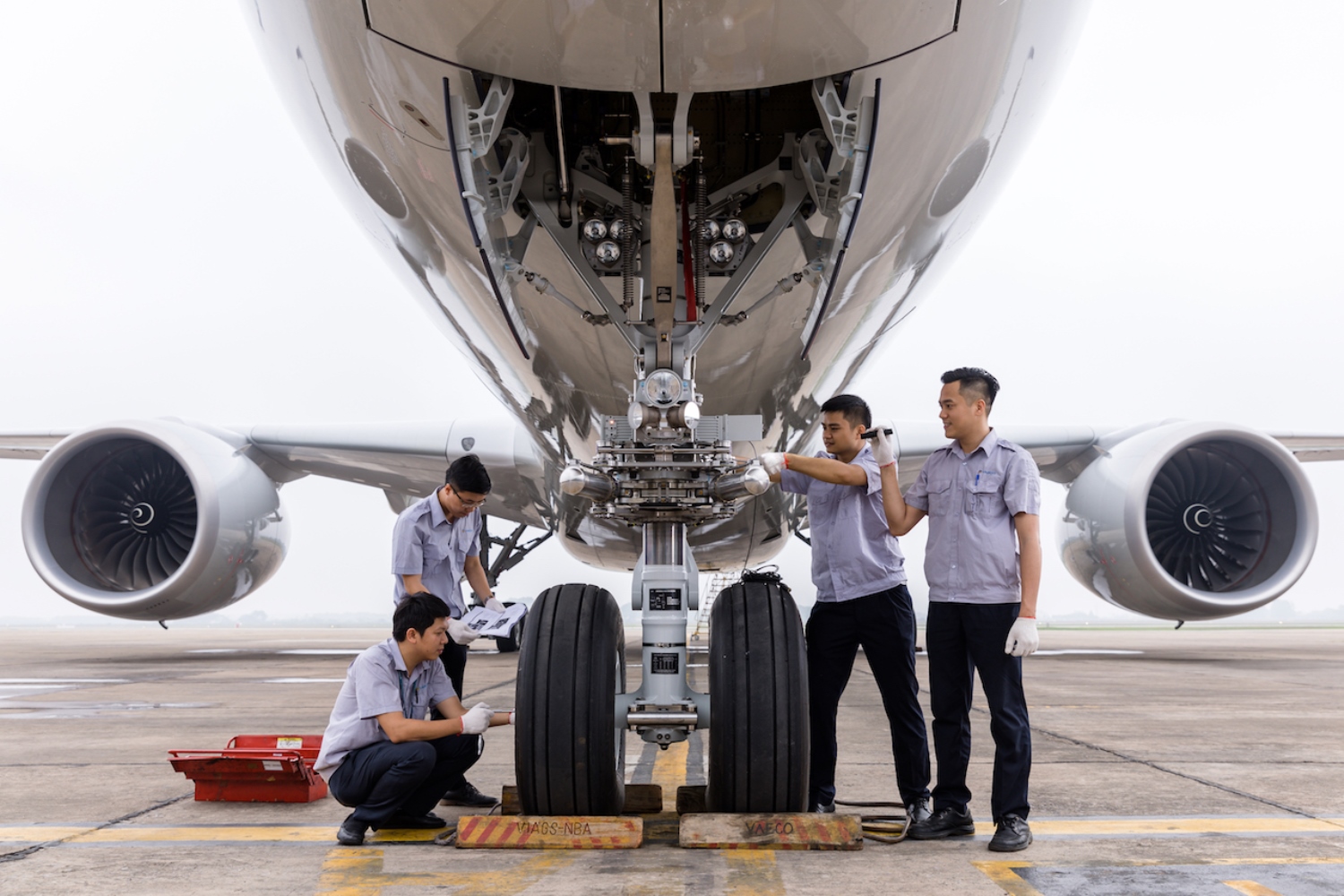The sounds of aircraft taking off and landing stirred up the murky atmosphere at Noi Bai International Airport on a rainy evening. Regardless of whether it rains or not, aircraft mechanics still work to ensure flight safety.
At 6:40am, an Airbus 350 aircraft was slowly moving onto the apron of Noi Bai International Airport. A group of three engineers led by Khuat Quang Huy had been waiting here. After the plane stopped, they headed towards the tip of the aircraft and checked all of its parts, from left to right.
The plane was scheduled to depart for Japan at 8:35am and they had only 90 minutes for maintenance.
“After each flight, a mechanical check is set within 90 minutes, during which the plane will be maintained or refurbished. Even a fingertip-size dent must be detected, even if the plane still operates normally,” Huy said.

Huy said the biggest pressure facing maintenance technicians is aircraft turnaround time, adding that cargo and food will be loaded onto the jet only after the maintenance group has confirmed its safety. All errors must be remedied ahead of departure time, and the technicians must fix the problems rapidly but faultlessly.
After this flight, Huy and his colleagues will prepare for the maintenance of another aircraft that is scheduled to take off at 12pm for Ho Chi Minh City.
Huy said sometimes an error is found when the plane is about to take off. In a recent incident, for example, an Airbus 330 aircraft was reported with a fuel valve problem right after its doors closed, prompting the crew to invite passengers to disembark for the repair work.
All errors must be remedied ahead of departure time, and the technicians must fix the problems rapidly but faultlessly.
Another example is the case of a new-generation Boeing 787 aircraft that was forced to stay in the apron and replaced by another when an error was found in its electronic system.
“Vietnamese engineers sent a letter to the French-based factory to ask for maintenance methods, and coordinated with experts in Vietnam to fix the problem. However, foreign experts only made suggestions while Vietnamese technicians carried them out. The work lasted for three days with many parts of the aircraft replaced. After the refurbishment, we felt proud,” Huy said.
Tran Tuan Quang, who has worked as an aircraft cabin mechanic for 11 years, said Noi Bai International Airport serves about 400 flights each day. The number climbs to more than 600 during holidays. Indoor maintenance staff deals with about 50 flights on average in one shift or 70-80 flights during peak times.
Apart from time pressure, aviation maintenance technicians are at high risk of occupational diseases.
“Normally, we have a break of 30-60 minutes between two flights. However, on peak days, there is no time to rest as planes take off and land constantly. Mechanics support each other in the work. After a person completes their tasks, they help their colleagues,” Quang said.
Apart from time pressure, aviation maintenance technicians are at high risk of occupational diseases.
“Sometimes, heavy rains come while we are on duty and then it’s sunny the next hours. Such extreme weather conditions are not good for human health. However, it is beautiful to see planes taking off in the rain. The aircraft wings covered by dust-like rain look beautiful. We feel proud when seeing repaired planes moving on the runway,” Huy said.

In the summer, the technicians have to put on masks, apply sun cream and wear hats to cope with the scorching heat. During the winter, outdoor engineers have to work in bitter cold temperatures, especially in the early morning.
“Maintenance engineers often experience noise-induced hearing loss or sore throats and sinus infection due to workplace pollution,” Huy added.

Since joining the team of aviation maintenance technicians seven years ago, Huy has had no holidays. He and his wife work opposite shifts. Huy said he often shed tears when standing alone in the apron amidst temperatures of 11-12 degrees Celsius and seeing other families on their holidays.
Over the past three years, Huy has welcomed New Year’s Eve in the apron. Huy will never forget the first time he celebrated New Year’s Eve far from home.
The engineer got married in 2014, but he could not join his family during the 2015 Lunar New Year. He spoke to his wife over phone. He only knew that it was New Year’s Eve after seeing fireworks lighting up the sky in Hanoi’s outskirts district of Soc Son while he was serving a flight that departed for Japan at 0:40am.
“I shook hands with my colleagues to say Happy New Year to them. Tet is still the same, there must be people working so that happiness will not be interrupted,” Huy said.
Sharing Huy’s feelings, Quang said: “When I was newly married, I felt sorry for my wife as she was alone during New Year’s Eve and other holidays. Luckily, she understands my situation and gets acquainted with this. She feels normal now.”
Tet is still the same, there must be people working so that happiness will not be interrupted
If he has to work on New Year’s Eve, he would find himself a little joy by watching passengers getting on planes excitedly.
He said he feels happy, as he has contributed to passengers’ family gatherings ahead of New Year’s Eve.
Such small happiness has motivated aviation maintenance engineers to work during holidays.
Although they receive less attention than pilots or flight attendants, the staff of 800 maintenance engineers are silently devoting themselves to flight safety.-VNA

Aircraft mechanics work hard for flight safety. (Photo: VietnamPlus)
